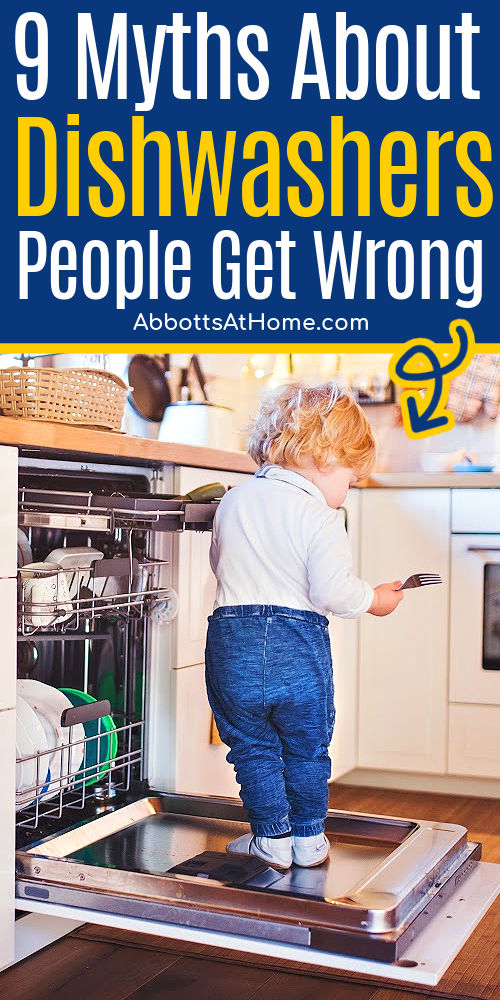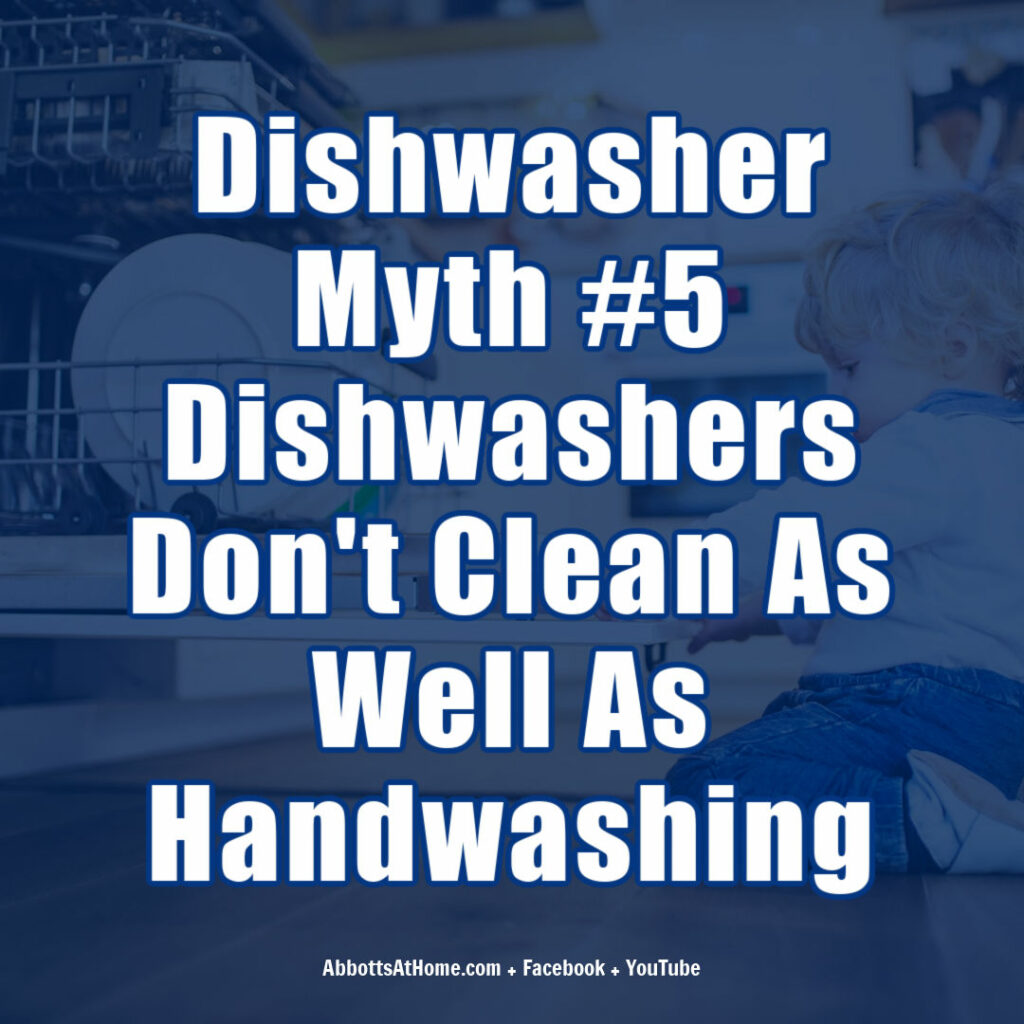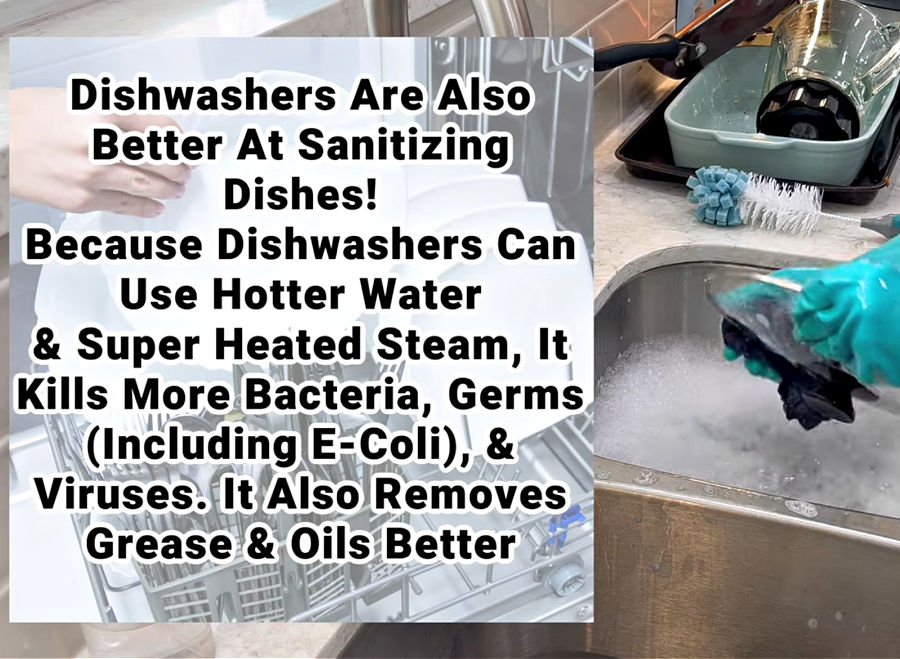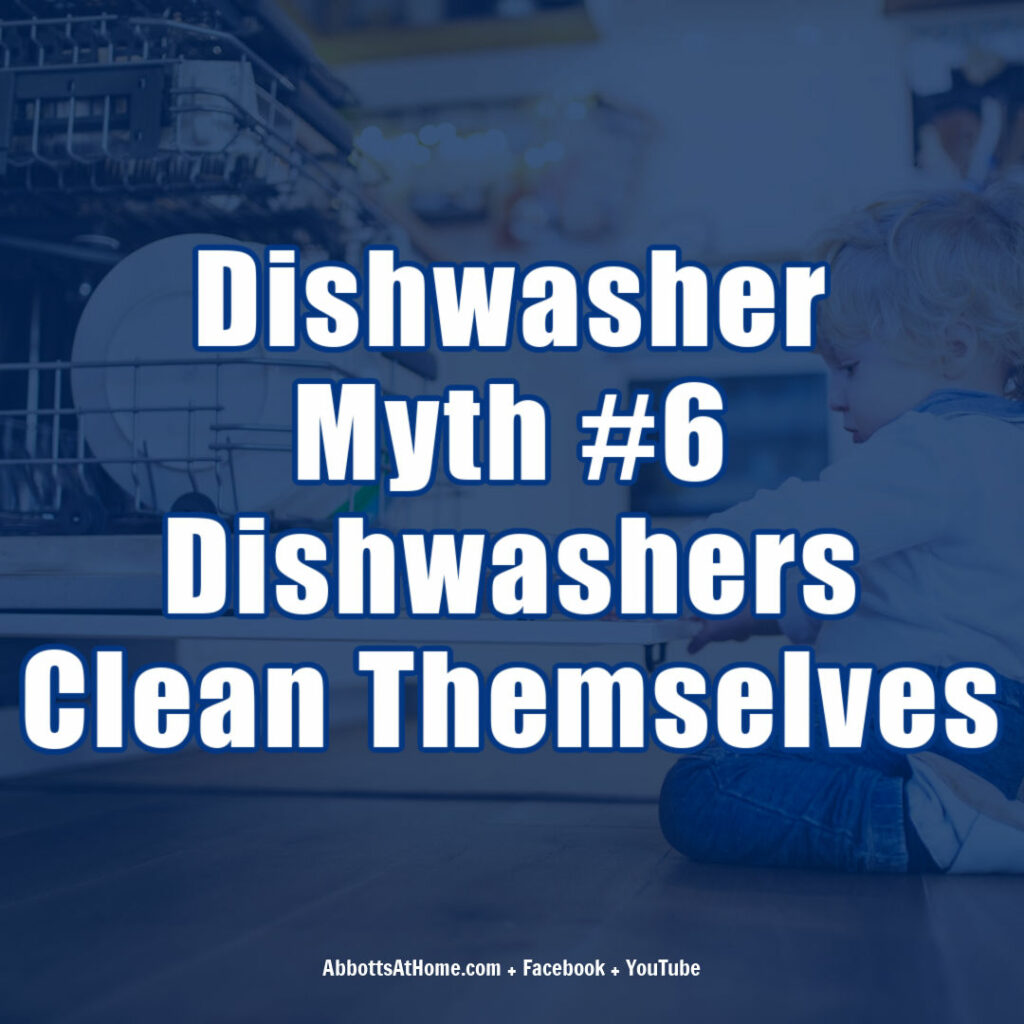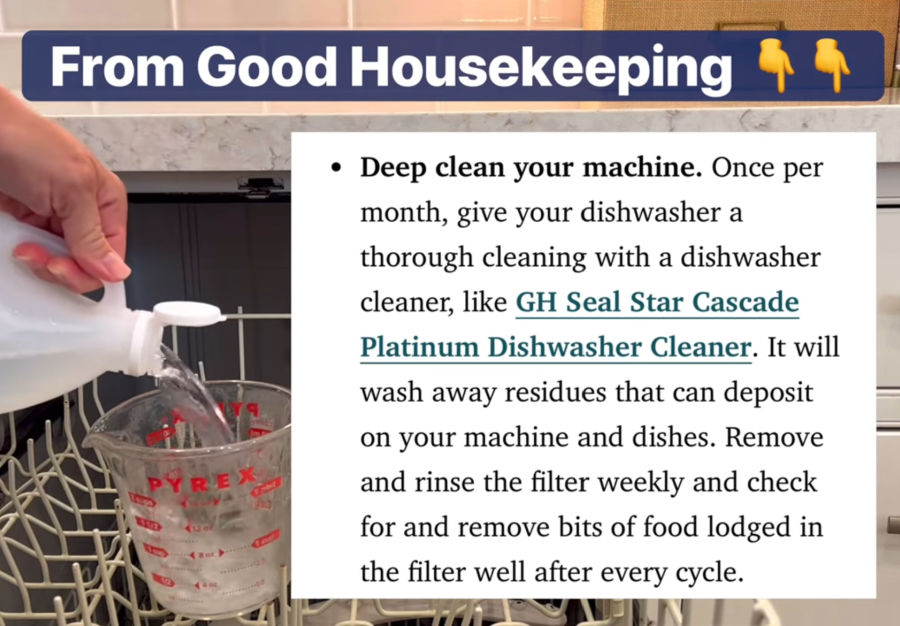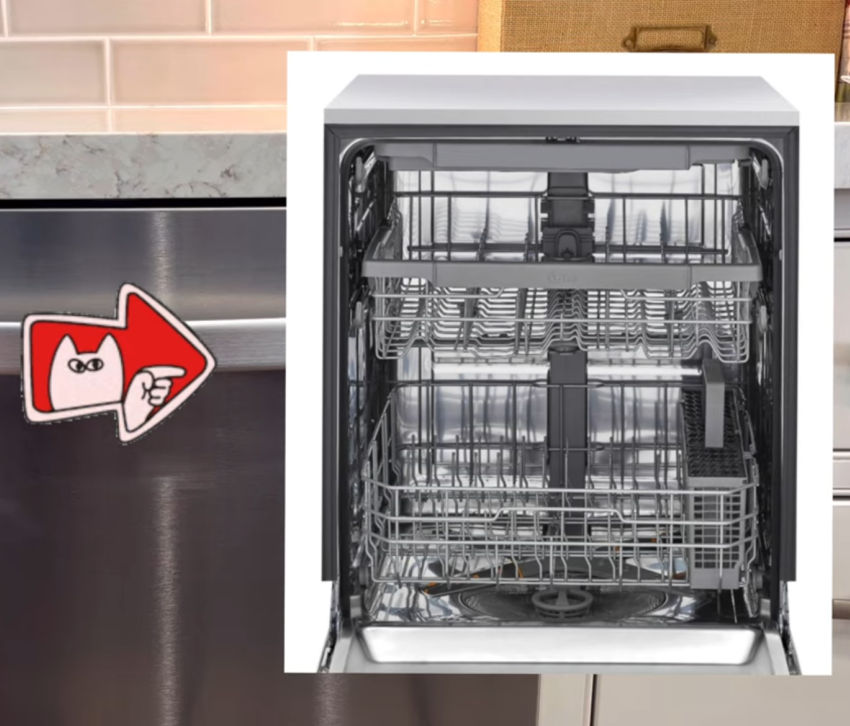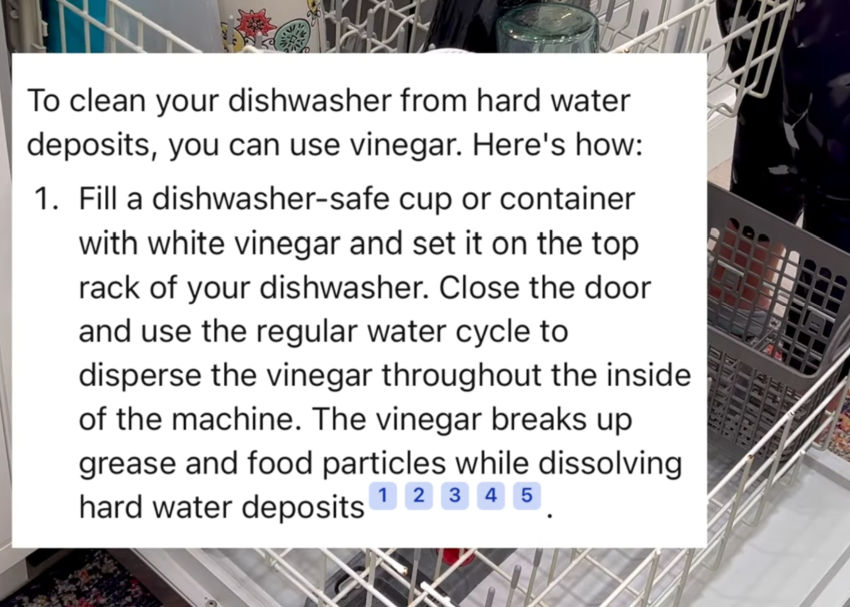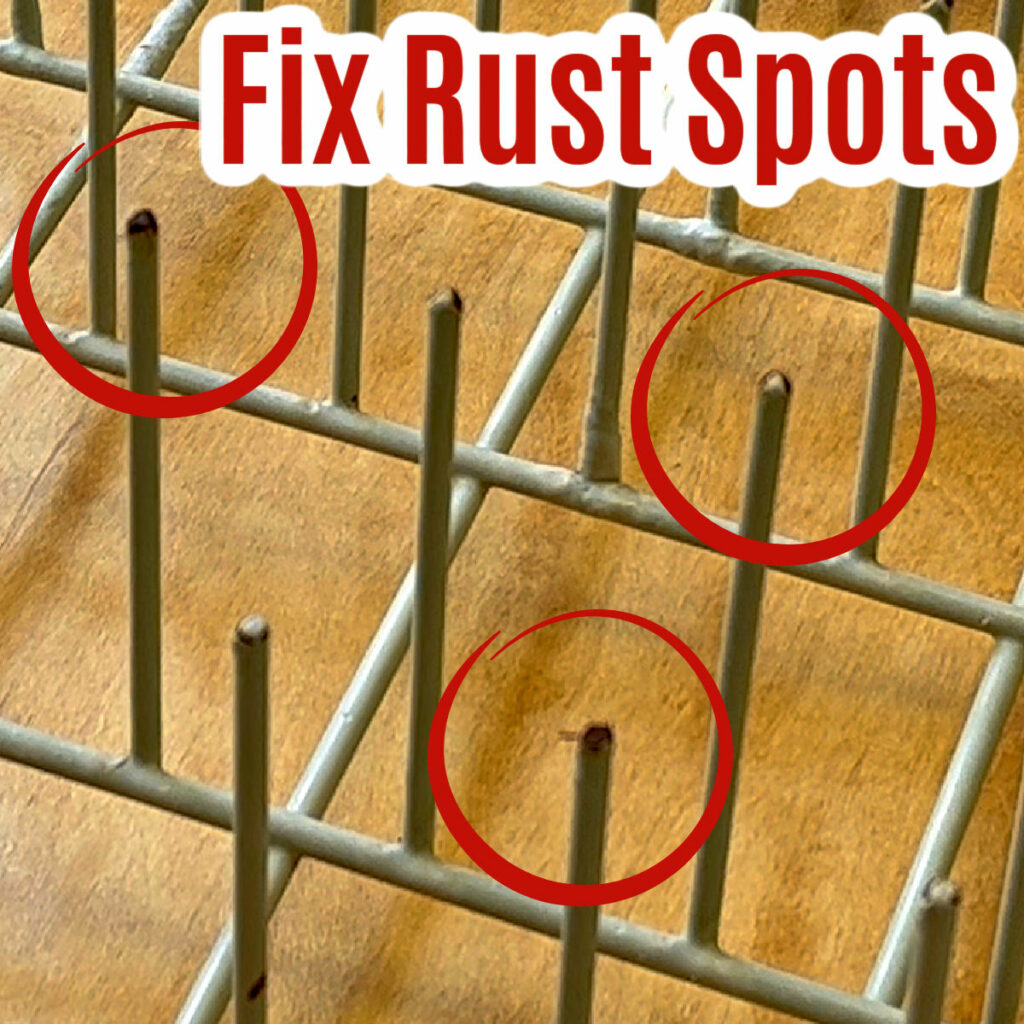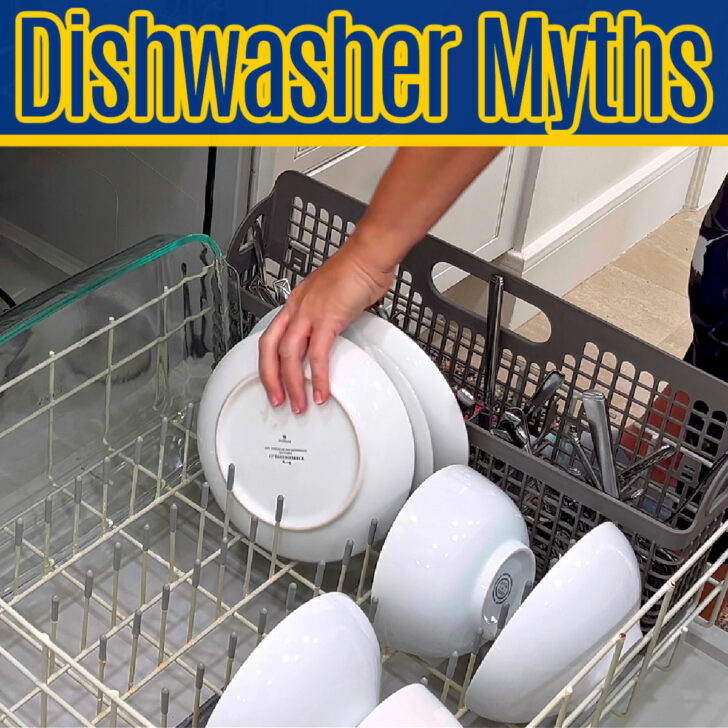Most of us are getting at least a few of these wrong when it comes to using dishwashers correctly. Here’s 9 COMMON MYTHS ABOUT DISHWASHERS.
9 Common Myths About Using A Dishwasher
Hi, guys! My name is Stephanie and I am back with more cleaning tips. Today we’re going to be going over nine myths about your dishwasher.
A few of these things are just common misconceptions. A few of them are old wives tales. And a few of them might have been true 20 or 30 years ago but since the technology around dishwashers has improved they’re just not true anymore.
But, no worries, I’ll cover all of these myths and the research behind the right way to use a dishwasher to get the cleanest dishes possible! Let’s get to it.
Prefer Video? Watch This Instead
Watch this video for a quick video showing all 9 Myths About Dishwashers. Scroll for written version.
9 Myths About Dishwashers
I have to admit, I still believed a few of these dishwasher myths until I did my research.
1. You Have To Pre-Rinse Dishes Before Loading Them
Let’s start with a common one. Myth number one is that you must pre-rinse your dishes before you put them in the dishwasher.
That might have been true 20 years ago but today’s dishwashers have Smart dishwashing technology. So that means that they can sense the food particles on the dishes.
And the “smart wash” or auto-wash” function on dishwashers can adjust the amount of water used or adjust the length of the dishwashing cycle to make sure that your dishes get clean.
So the dishwasher manufacturers and even the Good Housekeeping Institute ran tests on this and they suggest just scraping all of the food particles off of your dishes into a garbage can. You can leave whatever sauces and residue are left behind on the dishes. Just put them straight into the dishwasher.
Your dishwasher actually works better that way because the smart sensor in your dishwasher can tell that there is stuff there that needs to be washed away. So, it runs the dishwasher for an appropriate amount of time based on how dirty the dishes are.
If you rinse everything off beforehand the dishwashing cycle might not be long enough to completely sanitize those dishes.
And I’ve also seen a bunch of tests that suggest that the dishwashing detergent actually works better with unrinsed dishes too. The enzymes in modern detergents need food particles to attach to to get the best clean.
2. Delicate Items Cannot Be Washed In A Dishwasher
Dishwasher myth number two is that delicate items cannot be washed in your dishwasher. So people in the past would always leave their China or their glassware, breakable dishes like that, out of the dishwasher.
But again, most dishwashers can handle those items if you know how to load your dishwasher properly. Double check your manual, but in general those delicate items need to go on the top rack in your dishwasher.
And a trick that I like to do with wine glasses is to always have them surrounded by softer items like plastic cups, just to be extra safe. Also, some dishwashers have a gentle cycle designed just for breakables.
3. You Save Water By Hand Washing Dishes
Next up for the myths about dishwashers is that dishwashers use more water than handwashing dishes. Most dishwashers sold in the US these days are ENERGY STAR rated dishwashers.
Modern ENERGY STAR rated dishwashers use about 3.4 or 3.2 gallons of water per load. But, if you’re washing the same amount of dishes by hand you’re not going to be able to do it for less water than that.
I actually have a full video where I test a bunch of different ways that people say that they handwash dishes. The water usage for all of those methods was way above the average amount used by dishwashers
Check out that video if you want to see the methods I tested and the water usage numbers. But, according to ENERGY STAR data, modern dishwashers are more effective at saving water than handwashing dishes.
4. Dishwashers Use More Electricity Than Handwashing
Dishwasher Cleaning Myth number four is that dishwashers use more electricity than handwashing. And again, after all of the ENERGY STAR testing and research, it’s been shown that modern dishwashers using their own heating element to heat the water use less electricity than your homes water heater.
Here’s a link to the ENERGY STAR page on dishwashers if you want to check all of this research out yourself dishwasher. Be sure to click on the drop downs on this page to see full details.
5. Handwashing Gets Your Dishes Cleaner
Fifth on the list of myths about dishwashers is that handwashing your dishes can get your dishes cleaner than washing them in a dishwasher can.
But actually, extensive testing shows that as long as you’re using the hot water on your dishwasher it is way more effective at cleaning and sanitizing your dishes than you are going to be able to do handwashing.
That’s mainly because dishwashers can use a lot hotter water than you’re ever going to be able to use in a sink. That super heated dishwasher water is an effective sanitizer for your dishes.
The temperature reached inside of a dishwasher can effectively kill things like E.coli, viruses, bacteria, mold, and mildew. It’s also a more effective way of cleaning all of the gunk and oils off of your dishes.
Plus, you get that extra sanitizing boost at the end if you let it steam dry your dishes too.
6. Dishwashers Clean Themselves
This is one of those misconceptions, I think. It’s that dishwashers clean themselves. Many people believe that you’re cleaning your dishes in there. So, what you’re left with is a clean dishwasher.
But there is a filter inside of your dishwasher that needs to be cleaned regularly. If you don’t clean that filter regularly it’s going to lessen your dishwasher’s ability to clean your dishes.
And, just like in a tub or shower, soap residue and hard water minerals can build up inside the dishwasher. So you have to make sure to clean your dishwasher about once a month.
Start by cleaning the filter(s) and washing them with soap and hot water. Then run a store-bought dishwasher cleaner through an empty cycle in your dishwasher.
Or you can run your dishwasher with a cup or two of vinegar in the top rack of your dishwasher. Vinegar is actually what my dishwasher manual suggests for cleaning my dishwasher. See the steps I use to clean my dishwasher with vinegar in a previous post.
7. Dishwashers Are Noisy And Annoying
Seventh on the list of myths about dishwashers is that dishwashers are noisy and annoying. While some dishwashers can be kind of loud and annoying, you can buy dishwashers that are pretty much silent.
Typically, the soundproof dishwashers are the ones that have stainless steel inside. That stainless steel inside the dishwasher is a great sound barrier. You can be standing a couple feet away from the dishwasher and you wouldn’t know it was running.
8. Pouring Vinegar Into The Bottom Of A Dishwasher Cleans It
Dishwasher myth number eight is that pouring vinegar into the bottom of the dishwasher, then letting it run a cycle, is the best way to clean your dishwasher.
I know I just said that you could clean your dishwasher with vinegar, and that’s true, but you do need to put it in a cup on the top rack of your dishwasher.
If you pour it directly into the bottom of the dishwasher, most dishwashers, the first thing they do when you turn them on is drain all of the liquids out of the bottom of the dishwasher. So. it’s just going to drain all of that vinegar out of the dishwasher before it starts the wash cycle.
Also, if you pour vinegar directly into the bottom of the dishwasher, where all of the rubber parts and the gaskets are, it’s going to start to dry out and harden those parts. So use the cup on the top rack method I mentioned earlier.
9. Dishwashers These Days Don’t Last As Long As They Used To
And the last myth about dishwashers is that dishwashers these days just don’t last as long as they used to. Well again, according to ENERGY STAR research, the typical dishwasher these days lasts from 10 to 15 years.
The average lifespan of a dishwasher from the 1970s through the 1990s was 9 to 12 years. So, current dishwashers last longer than they did in the past, but they do require regular maintenance.
To extend the life of your dishwasher, make sure that you’re doing your monthly dishwasher maintenance; clean out that filter every month, follow the recommendations in your dishwashers manual, and always use the right detergent in your dishwasher.
And, to avoid hard water buildups, if you live in a hard water area, make sure that you’re using a hard water softener on your house and a monthly dishwasher cleaner that can remove hard water deposits from your dishwasher.
Another Tip To Extend The Life Of A Dishwasher
If you’re into DIY or know a good handyman, you can replace and repair minor damage to your dishwasher pretty easily.
For example, my soap dispenser broke. So, I bought a replacement part off of Amazon to replace that myself. All I needed was a screwdriver for that repair. I also replaced my silverware dispenser when it started to break and the silverware was falling through.
I also have another tutorial showing how to repair rust spots on your dishwasher rack. When your racks start to get rust spots, you don’t have to replace your dishwasher racks. Those can cost hundreds of dollars.
Well guys, that’s my nine myths about dishwashers let me know if you have any questions in the comments on the video. I do try to answer them when I get a chance.
Related DIY Home Projects
- Easy Steps To Clean A Dishwasher & Dishwasher Filter With Vinegar (Includes Video)
- Fix Your Rusty Dishwasher Rack: Super Easy DIY Steps & Video
- Can Glasses Be Washed In The Dishwasher? The Surprising Answer is YES & NO!
- Testing 6 Ways To Remove Scratches On Plates And Dishes: One Winner! (Video & Steps)
- What To Use In A Bissell Spot Cleaner: 6 Best Alternatives
- Testing 3 Ways To Remove Old Laundry Stains After Drying (1 Worked Best)
More DIY Projects for Homeowners
You might also like this DIY to Remove Water Stain from Ceiling Without Paint.
Feeling inspired? Now that you’ve read these myths about dishwashers, I hope they helped in some way!
Let me know if you have questions. Don’t forget to sign up for the Abbotts At Home email newsletter to get DIY, Remodeling, and Crafty ideas in your inbox.
Stephanie Abbott has been remodeling homes, updating & building furniture, and working on DIY home maintenance and cleaning tips for over 20 years. Her remodeling has been featured in Better Homes and Gardens Magazine. And, her DIY YouTube channel has had more than 8 million views.
Most of the DIY tutorials and videos on this site focus on beginner to intermediate level DIY Projects that can be done in an affordable way without high-end, expensive tools. All of the cleaning tips on this website have been tested in her home.

